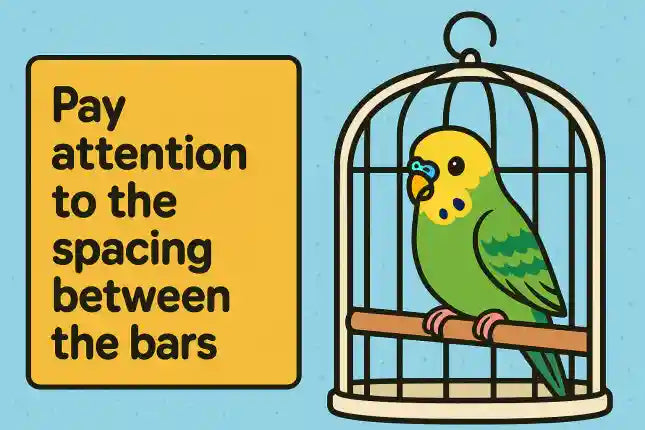Creating a Comfortable Home for Your Feathered Friend
Keeping birds as pets has long been a source of joy for many people. With their vibrant feathers, intelligent personalities, and cheerful chirping, birds can bring a lot of life and colour into a home. However, one of the most important aspects of bird care is choosing the right bird cage. It’s not just a container—it’s your bird’s home. The right cage plays a key role in supporting your bird’s physical and mental well-being. Here's a practical guide to help you make the best choice.
1. Cage Size M![]() atters – Match It to Your Bird's Breed and Activity Level
atters – Match It to Your Bird's Breed and Activity Level
Different birds have different space needs. Smaller birds like finches, budgies, or cockatiels require less space than larger parrots, but they still need enough room to move around freely. As a general rule, the cage should be wide and tall enough for the bird to fully stretch and flap its wings without touching the bars or accessories.
For active or larger birds like cockatoos or macaws, a spacious cage—or even a cage combined with a play stand—is essential to prevent stress and boredom. When in doubt, always go for the largest cage your space and budget allow.
2. Bar Spacing and Safety Features
The spacing between the cage bars is a critical safety detail. Bars that are too wide can lead to injuries or allow smaller birds to escape. For small birds, bar spacing should be no more than 1–1.5 cm, while larger birds can have spacing of 2 cm or more.
Also check the construction quality. Bars should be strong enough to withstand chewing, especially for parrots. Sharp edges or poorly welded joints can be dangerous. Look for cages with smooth finishes and secure, bird-proof locks to prevent clever escape attempts.
3. Choose Non-Toxic, Durable Materials
Cages come in a variety of materials—painted metal, powder-coated steel, and stainless steel being the most common. Painted or coated cages are more affordable, but you’ll want to ensure they’re free of toxic metals like lead or zinc, which can be harmful if ingested.
For long-term use, stainless steel cages are a top choice. They’re rust-resistant, easy to clean, and extremely durable. While the price tag may be higher, they’re worth the investment for your bird’s health and your peace of mind.
4. Practical Design for Cleaning and Interaction
A well-designed cage should make your daily tasks easier. Look for cages with a pull-out tray at the bottom to simplify cleaning. Large front or top doors allow easy access for feeding or bonding with your bird. Some models even have sliding feeder doors, letting you change food and water without opening the main door.
If your bird enjoys sunlight and fresh air, consider a cage with wheels so it can be moved between indoor and outdoor areas. Good ventilation and natural light can improve your bird’s mood and overall health.

5. Accessories That Enrich Your Bird’s Life
Birds are curious and active by nature. To keep them engaged and mentally stimulated, choose a cage with the right accessories. Natural wooden perches help maintain foot health. Food and water bowls should be securely attached and easy to clean.
Some birds love to bathe—add a bird bath or shallow water tray. Chew toys, climbing ladders, and swings also help mimic the bird’s natural environment and prevent boredom. If your bird needs privacy or a place to sleep, consider adding a nest box or a cage cover for nighttime.
6. Consider Your Home Layout and Cage Aesthetics
Where you place the cage in your home also matters. If it’s going in the living room or balcony, a floor-standing cage with a stylish design may blend in better. For smaller spaces like bedrooms or studies, a tabletop or wall-mounted cage could be a better fit.
Think about ease of access and visibility too. Birds are social animals—they enjoy being part of the family activity, so don’t tuck the cage away in a quiet, isolated corner for long periods.
Final Thoughts: A Cage Is More Than a Container—It’s a Home
Choosing a bird cage isn’t just about buying the right size. It’s about understanding your bird’s habits, ensuring their safety, and providing a space where they can thrive physically and emotionally. A thoughtfully chosen cage can lead to a happier, healthier bird—and a more rewarding relationship between you and your feathered companion.
Whether you’re a new bird owner or looking to upgrade your current setup, taking the time to research and invest in the right cage is one of the most important decisions you can make.

